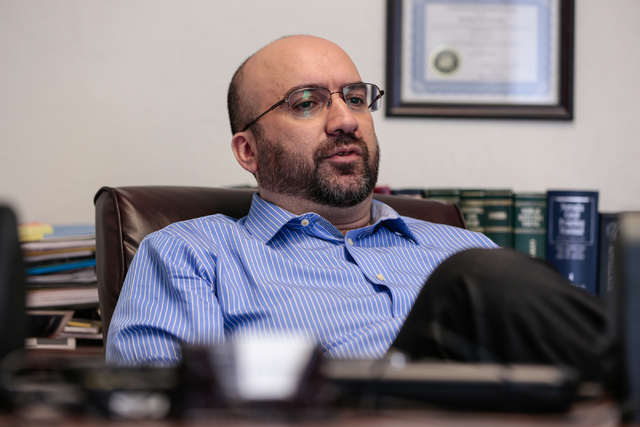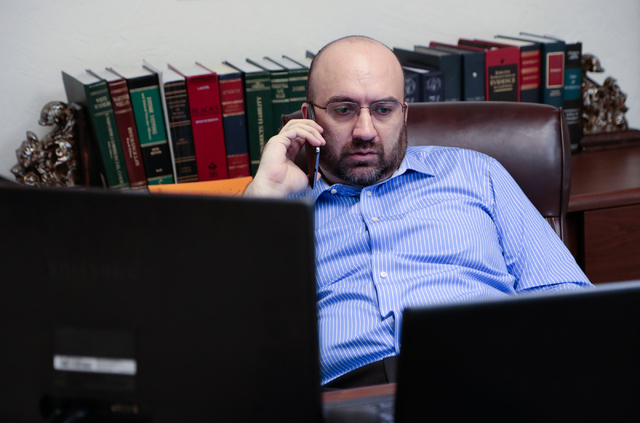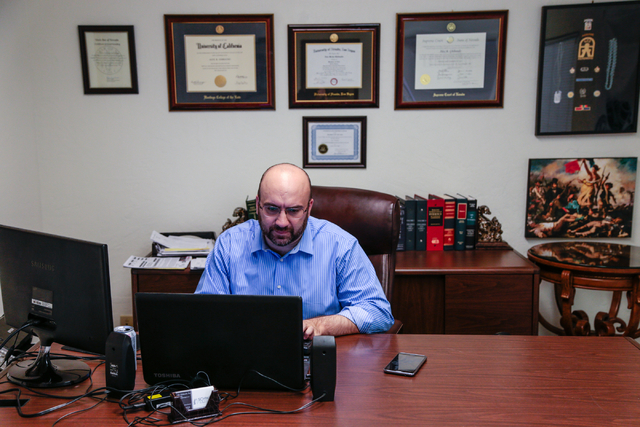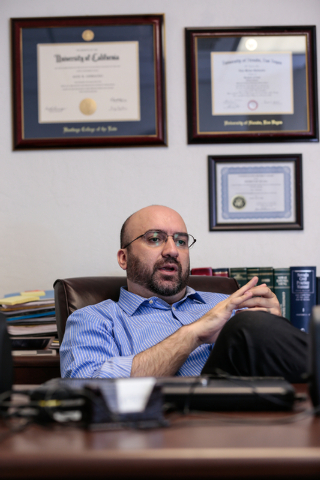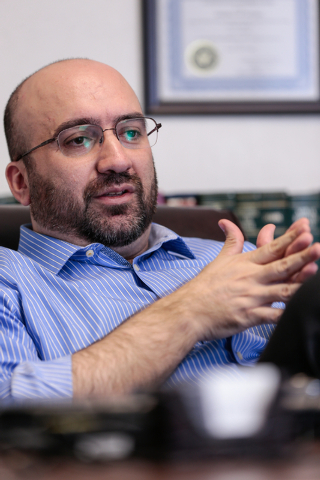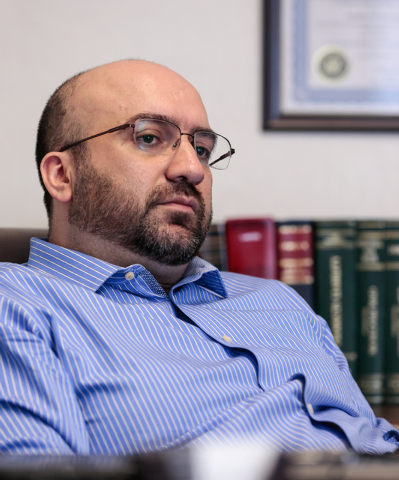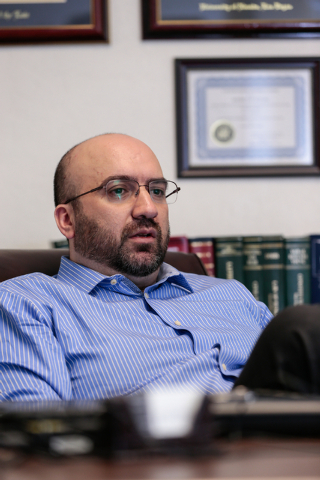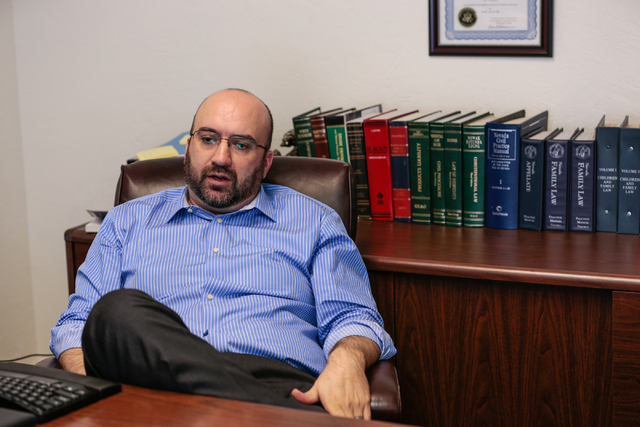Las Vegas lawyer seeking redemption comes clean about troubled past
Las Vegas attorney Alex Ghibaudo knows prospective clients will Google his name and learn about his suspension.
And he knows his peers have been talking about him behind his back, although no one wants to ask him about his past.
So Ghibaudo, 39, has decided to tell his story publicly — all of it: the alcohol abuse, the prostitutes, the suicide attempts, the jail time. All of it.
“I’m just tired of it being like this big secret,” Ghibaudo said during a recent interview in his second-story office on West Sahara Avenue.
The Nevada Supreme Court reinstated Ghibaudo to the practice of law, with conditions, in May 2014 — nearly five years after the court suspended him. He partnered with Evan Schwab in December and is now handling about 30 cases. In March, he traveled to Carson City to argue before the Supreme Court in a child custody case.
Ghibaudo has come a long way back from what he calls “a downward spiral of epic proportions.”
Time will tell how far he’ll get.
LONG WAY DOWN
He credits his rebound to learning that he suffers from bipolar disorder, a condition that causes extreme mood swings, and the treatment he has received since being diagnosed.
“There is not enough awareness amongst professionals, and lawyers in particular, about how their mental health impacts their lives and the lives of those they serve and those they love,” Ghibaudo wrote in a recent email about his decision to share his story. “Only someone who’s been there and back can offer that insight.”
Much of Ghibaudo’s story is documented in records related to his disciplinary proceedings.
Ghibaudo, a high school dropout who spent time in the Army and later earned a bachelor’s degree in political science, said his disorder “really started manifesting itself” after he was admitted to the University of California Hastings College of the Law in San Francisco. His wife, Tara, and their children stayed behind in Las Vegas while he attended law school.
For the first year, he flew home on weekends. But he soon began doing his “own thing,” which involved drinking heavily and spending time with prostitutes. He blew through an inheritance and rarely went to class.
“I was in one of the best schools in the country, and I didn’t care,” he said.
He described his relationship with his wife at that time as “icy, kind of like strangers maybe.”
Ghibaudo isn’t sure how he graduated but was awarded his law degree in 2006. He then went to work for his brother in Southern California, where he stayed for a year before returning to Las Vegas. He received his Nevada law license in December 2007 and started his own firm.
The son of Argentine immigrants, Ghibaudo is fluent in Spanish, so he focused on marketing to the Hispanic community.
But, by his own account, he “knew less than nothing about the law” and “even less about running a business.”
He did well at first, but his firm ran out of money when the economy collapsed.
Also, in April 2008, Ghibaudo folded under his wife’s questioning and confessed all of his sins, sending their marriage into a tailspin.
“I didn’t leave anything out,” he recalled.
Tara Ghibaudo remembers demanding to know every detail.
“Like an idiot, he told me,” she said. “He had been unfaithful several times and spent family money on that.”
Tara Ghibaudo fell apart. She became an out-of-control alcoholic.
“I wanted to numb myself,” she recalled.
At the same time, her husband fell into a deep depression. Records indicate a suicide attempt in August 2008, with three days in the hospital.
In September 2008, with both his business and marriage failing, Alex Ghibaudo accepted a $90,000-a-year job with attorney Joseph Scalia. Overwhelmed, he abruptly left Scalia’s law firm in January 2009 and resumed solo practice. Meanwhile, his marriage became violent.
Tara Ghibaudo sought and received a temporary restraining order against her husband and filed for divorce in March 2009.
Alex Ghibaudo violated the restraining order and was arrested. He pleaded guilty and was ordered to pay a fine.
The couple soon reconciled, but on July 4, 2009, Alex Ghibaudo was arrested on a domestic violence charge. His wife posted bail for him the next day.
Rob Bare, counsel for the State Bar of Nevada at the time, contacted Alex Ghibaudo on Monday, July 6. Among Bare’s concerns was an attorney’s claim that Ghibaudo had threatened his life.
Alex Ghibaudo recalled Bare telling him, “You really just need to take a step back and get your life together.”
Bare persuaded the troubled lawyer to agree to a suspension and also found people to assist with his legal and personal problems. Ghibaudo still considers Bare, now a district judge, “one of the nicest guys you’ll ever meet.”
Nevertheless, Ghibaudo tried suicide again that night. At Montevista Hospital, he was diagnosed with bipolar disorder and placed on medication.
HITTING BOTTOM
On Aug. 7, 2009, the Supreme Court issued an order of temporary suspension that accused Ghibaudo of:
■ Repeatedly abandoning clients.
■ Failing to provide an accounting of client funds.
■ Failing to respond to the office of bar counsel after repeated requests regarding multiple grievance files.
■ Making several “unprofessional and demeaning telephone calls” to other attorneys.
After his release from the hospital, Alex Ghibaudo was hired as a $15-an-hour law clerk in Scalia’s office.
In February 2010, he again was arrested on a domestic violence charge involving his wife. He now calls the subsequent guilty plea and about 90 days in jail the “best thing that ever happened” to him.
“When I was in jail, they put me on a drug regimen,” he said.
He said the daily medication gave him “clarity” and helped him realize he had a problem. Although he continued to struggle, he began taking his condition seriously.
Ghibaudo worked for a couple of other attorneys in 2011, the same year his wife committed herself to a 30-day rehabilitation program. She said she has been sober for more than three years now.
In 2012, Ghibaudo was approved for Veterans Administration benefits and began regular treatment that stabilizes his moods.
And he credits his work as a law clerk with making him a better researcher and writer.
“I’m an all around better lawyer than I would have otherwise been,” he said.
Alex Ghibaudo said he and his wife, who testified at his reinstatement hearing, “have never had a better relationship.” The couple, who have a 13-year-old daughter, didn’t go through with the divorce.
Tara Ghibaudo, who also has a 20-year-old son from a prior relationship, said her husband is a different person now.
THE WAY BACK
“He just wants to do the best work possible, and he does it with empathy and compassion because he’s been there,” she said as she fought back tears. “And I commend him for that.”
Tara Ghibaudo, 41, still takes some of the blame for her husband’s arrests. Usually, she was the one who called police. She said she wanted him to feel the pain she was feeling.
“There was a lot of screaming,” she said. “There was a lot of shouting, but a lot of times it was instigated by me.”
Tara Ghibaudo doesn’t spend time worrying that she or her husband will get off track again.
That’s a skill she learned during her quest for sobriety.
“I cannot predict about what’s going to happen in the future,” she said. “All I have is today.”
Ghibaudo doesn’t expect his current drug regimen to work forever, however. With the help of others, he must constantly evaluate and re-evaluate himself.
Conditions imposed as part of his reinstatement ensure he will have plenty of support during his two-year probationary period.
He may not have a solo practice, and he must continue psychological and psychiatric treatment, including taking prescribed medication.
“And he shall provide bar counsel with a relapse-prevention plan approved by a licensed health-care professional upon the completion of the probation period,” the order reads.
He also had to pay more than $13,000 to the State Bar’s Client Security Fund. Records indicate that his misconduct led several clients to seek compensation from the fund.
His mentor, veteran attorney William Terry, must file quarterly reports for the bar as a neutral third party.
It’s not the first time Terry has served in this capacity, and he said Ghibaudo isn’t unique. He said he has seen others hit rock-bottom but go on to succeed.
Schwab, who worked with Ghibaudo at a different firm, said his struggles have made him a better lawyer. He can relate to his clients, Schwab said: “He can trade stories.”
More than anything, Ghibaudo wants people to understand that bipolar disorder can be managed.
“It’s when it’s not treated that you need to worry,” he said.
During two lengthy interviews in his office, Ghibaudo showed no emotion, even when discussing his suicide attempts.
Does he have any regrets?
“I regret my whole damn life, to tell you the truth,” he said.
Contact Carri Geer Thevenot at cgeer@reviewjournal.com or 702-384-8710. Follow @CarriGeer on Twitter.



